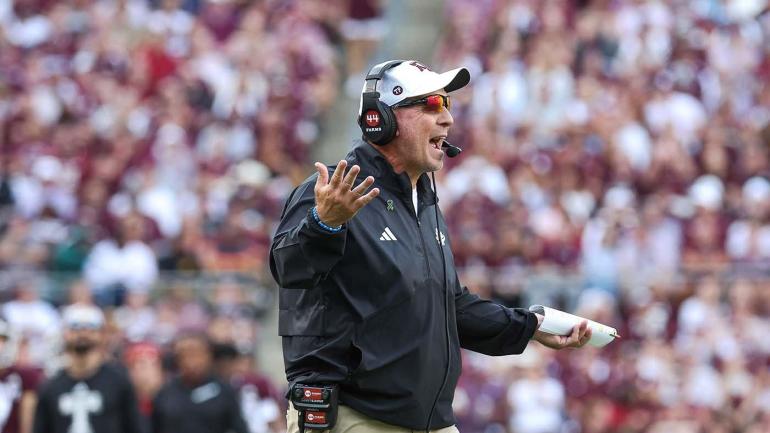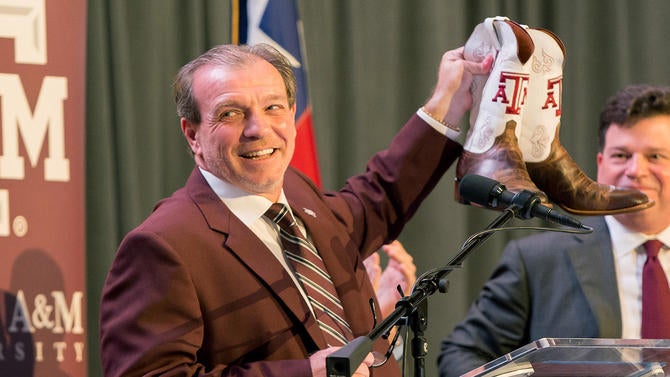
The day Jimbo Fisher inked a fully guaranteed 10-year, $75 million contract with Texas A&M was the beginning of a great experiment in college football. Salaries were quickly rising, sure, but Fisher's contract structure broke the market.
Fisher's contract with the Aggies promised him every cent outlined within the agreement, even if he was fired. For comparison, seven-time national champion Nick Saban has a $44 million buyout. Even worse, Fisher owed the school zero buyout dollars to leave for another job. There was no offset language in the contract, meaning that Fisher would get the entire worth of his deal even if he were to take another job. Essentially, he earns more money by getting fired than he ever could by coaching.
When LSU came calling in 2021, Texas A&M doubled down. The Aggies signed Fisher to another 10-year, $95 million contract, which simply restarted the clock. Just two years later, however, those chickens came home to roost.
Fisher was fired on Sunday amid a middling 45-25 record as Texas A&M coach. Now, he will be paid more than $70 million to not coach. The mark is more than triple the next-biggest buyout in college sports history. When taking into account the costs of buying out Fisher's contract, his staff and the salary and buyout of a new staff, the transaction could ultimately cost Texas A&M athletics more than $120 million with potentially more than $50 million due in the coming weeks. That's enough to make Bobby Bonilla blush.
Clearly, Texas A&M has the money to burn, even though Fisher is owed about $10 million more than the GDP of Tuvalu. With a wide network of big-money donors, the Aggies have the means to print money seemingly on command. But for the rest of college football, Fisher's firing on Sunday should be a warning sign for any program that thinks they can buy their way to relevance.
While the Fisher contract was ridiculed at the time, it ultimately created an arms race. In 2021, LSU lured Brian Kelly away from Notre Dame with a 10-year, $100 million offer. Former Michigan State coach Mel Tucker also cashed in thanks to LSU, signing a 10-year, $95 million deal with the Spartans. Lincoln Riley became the first Oklahoma coach to leave his post for another college job since 1947 when he signed a contract worth a reported $110 million to coach USC.
In the two years since, results have been decidedly mixed. Every one of the mega-contract coaches have experienced less success since signing. Fisher won 78% of his games at Florida State but fell to just 64% at Texas A&M, including an 11-11 record after signing his new contract in 2021. Kelly won the SEC West in his first year at LSU but sits at 17-7 after three New Year's Six appearances in four years at Notre Dame. Riley is in the midst of his worst season as a head coach at USC and has lost nearly as many times in 25 games at USC (7) as he did in six years at Oklahoma (10). Tucker was fired for cause but went from 11-2 to 5-7 the year after he signed the contract.
To the contrary, almost every CFP contender hired their coach through a more traditional route. Kirby Smart (Georgia), Ryan Day (Ohio State), Dan Lanning (Oregon) and Steve Sarkisian (Texas) were big-time coordinators before getting their shots. Kalen DeBoer (Washington) and Mike Norvell (Florida State) coached at Group of Five schools. Jeff Brohm (Louisville) left one Power Five job for another, but it was to return to his alma mater.
Granted, Michigan's Jim Harbaugh and Saban were big swings coming from the NFL, but neither was given the kind of unfettered, unapologetic financial control that the modern contracts have awarded. And it's worth remembering that Harbaugh only reached national success after his massive contract was stripped, though a new deal is reportedly in the works now.
"There's a market for a lot different contracts than what we had," Texas A&M athletic director Ross Bjork told reporters after Fisher was fired. "And you can hire a great coach. So we're going to look at all of that. So we have to learn a lesson. Look at the dynamics around that decision in 2021… clearly, it didn't work out. We're going to learn from that and make sure that we don't make those same mistakes again."

Is Texas A&M really prepared to live that out, though? A handful of reported candidates include Lanning, Norvell and even Clemson's Dabo Swinney. Luring a candidate of that caliber would cost even more than Fisher. Duke's Mike Elko and UTSA's Jeff Traylor provide highly successful program builders who would be a great fit for Texas A&M, but is the athletic department willing to burn $100 million without making a splash? Selling the flashy hire can be easier than the right hire.
Of course, there's a difference between stealing a top coach with big money and rewarding your own. Saban is the highest-paid coach in college football, but he's won six national championships at Alabama. Two-time national champions Smart and Swinney have contracts worth more than $110 million, sure, but when Smart first began his tenure at his alma mater he was the SEC's 10th-highest paid coach at $3.75 million per season, while Swinney earned just $900,000 when he was promoted to full-time Clemson coach in 2009.
In fact, the last national championship-winning coach that was hired directly from another Power Five school was Gene Chizik, who was the 20th-highest paid coach in college football when he led Auburn to a title in 2010. With the number of high-profile poachings across the sport, that could change, but no program has even earned a the College Football Playoff berth with a money-whipped coach.
When Fisher arrived in Aggieland, he was gifted a national championship plaque with a blank date on it. Anything less than bringing home a championship for Texas A&M for the first time since 1939 was a failure. A cool $75 million guaranteed to one man shouldn't buy any less. Six years later, the Aggies are heading back to the market still in search of their first conference championship since 1998. Even worse, Florida State -- Fisher's previous program -- is right back in the national championship race while Texas A&M languishes in mediocrity.
Let that serve as a warning to athletic directors: Exorbitant, debilitating coaching contracts can't simply buy success. The Jimbo Fisher experiment has failed.

















